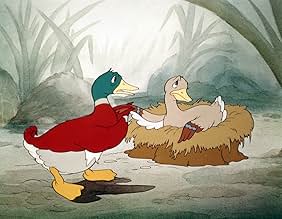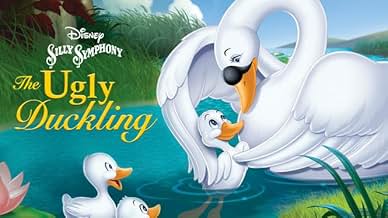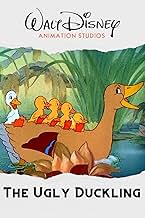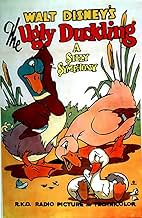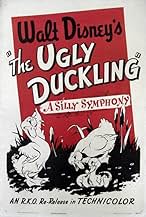VALUTAZIONE IMDb
7,6/10
3974
LA TUA VALUTAZIONE
Un piccolo anatroccolo è ignorato dalla sua famiglia e da tutti gli altri animali ed uccelli perchè è diverso, finchè una mamma cigno decide di adottarlo e crescerlo come se fosse uno dei su... Leggi tuttoUn piccolo anatroccolo è ignorato dalla sua famiglia e da tutti gli altri animali ed uccelli perchè è diverso, finchè una mamma cigno decide di adottarlo e crescerlo come se fosse uno dei suoi figli.Un piccolo anatroccolo è ignorato dalla sua famiglia e da tutti gli altri animali ed uccelli perchè è diverso, finchè una mamma cigno decide di adottarlo e crescerlo come se fosse uno dei suoi figli.
- Regia
- Sceneggiatura
- Star
- Vincitore di 1 Oscar
- 1 vittoria in totale
Amanda Cewel
- Mother Duck (speaking)
- (non citato nei titoli originali)
Tom Cotry
- Father Duck (speaking)
- (non citato nei titoli originali)
Recensioni in evidenza
A great short animation offering to Hans Christian Andersen text new touches, significances and nuances.
A remake , seductive for colors but especially for the echo in contemporary crisis , from social exclusion to need of love and the apparences, selfishness, migrants and the truth more significant than the misery of previews details.
So, I saw it after good decades and I saw it from different perspective , first in context of its time, then in the context of our time , dizzy , confuse and looking for sense.
So, easy to define it as loving and just precious. So, the ugly duckling and the steps to find its happiness.
A remake , seductive for colors but especially for the echo in contemporary crisis , from social exclusion to need of love and the apparences, selfishness, migrants and the truth more significant than the misery of previews details.
So, I saw it after good decades and I saw it from different perspective , first in context of its time, then in the context of our time , dizzy , confuse and looking for sense.
So, easy to define it as loving and just precious. So, the ugly duckling and the steps to find its happiness.
'Ugly Duckling (1939)' was the final film in Disney's "Silly Symphonies" series, and was also their only remake of a previous Symphony. Wilfred Jackson's 'The Ugly Duckling (1931)' was a rather primitive black-and-white adaptation of Hans Christian Anderson's famous tale, which drastically altered the original story to make (at least in my interpretation) a rather touching plea for racial tolerance. Jack Cutting's 1939 film is considerably more polished, animated in vivid Technicolor that speaks to the extraordinary degree of prestige that Walt Disney's company enjoyed throughout the 1930s. It is also considerably more faithful to Anderson's story, following the "ugly duckling" around the pond as he attempts to find his place in society. Unlike the 1931 duckling, which was somewhat grotesquely, Cutting's version is cute and likable, if a bit gawky compared to his ostensible siblings. Nevertheless, either bird, however handsomely they are drawn, will immediately capture your heart with their wide-eyed innocence, amplified tenfold by the persecution that they much endure for simply being "different."
The duckling's hatching causes much consternation at the adult ducks' nest, with the father understandably anxious that his wife has apparently given birth to a youngster that quite obviously didn't inherit his genes. After being unceremoniously banished from the duck family, the "ugly duckling" strikes out alone, desperate to find somewhere where he can be accepted for who he is. Glancing down into his reflection on the pond surface, in one of the short's most touching moments, the duckling sees his own reflection, hideously distorted by the water ripples, and breaks into tears. Fortunately, a happy ending is just around the corner, and the duckling's lonely honks of despair are answered in kind by a family of swans, who immediately take our hero under their wing, so to speak. Unfaultable in terms of animation, music and characterisation, 'Ugly Duckling' is a touching celebration of accepting and savouring one's own differences, and was justly awarded with an Oscar for Best Animated Short Film, Disney's seventh Silly Symphony to do so.
The duckling's hatching causes much consternation at the adult ducks' nest, with the father understandably anxious that his wife has apparently given birth to a youngster that quite obviously didn't inherit his genes. After being unceremoniously banished from the duck family, the "ugly duckling" strikes out alone, desperate to find somewhere where he can be accepted for who he is. Glancing down into his reflection on the pond surface, in one of the short's most touching moments, the duckling sees his own reflection, hideously distorted by the water ripples, and breaks into tears. Fortunately, a happy ending is just around the corner, and the duckling's lonely honks of despair are answered in kind by a family of swans, who immediately take our hero under their wing, so to speak. Unfaultable in terms of animation, music and characterisation, 'Ugly Duckling' is a touching celebration of accepting and savouring one's own differences, and was justly awarded with an Oscar for Best Animated Short Film, Disney's seventh Silly Symphony to do so.
The only reason I give this film a 9 and not a 10 is that it's actually a remake of a film this same studio made eight years earlier. I tend to be a little tougher on remakes plus it just doesn't take nearly as much effort to remake a film instead of do one from scratch. However, despite this concern, I can see why this film received the Oscar for Best Animated Short. It is simply wonderful from start to finish.
First, the animation is exactly what you'd expect from Disney from this era. In the 1930s, no other studio came close in quality of animation and music. The whole package was simply terrific and could not be beat. I particularly loved the wonderful backgrounds as well as the great use of colors--nicely muted and soft.
Second, the story, while very familiar to most, is wonderful. I am not ashamed to admit that by the end of the film, my eyes were very misty--it is a lovely and sentimental film. A joy to watch from start to finish.
First, the animation is exactly what you'd expect from Disney from this era. In the 1930s, no other studio came close in quality of animation and music. The whole package was simply terrific and could not be beat. I particularly loved the wonderful backgrounds as well as the great use of colors--nicely muted and soft.
Second, the story, while very familiar to most, is wonderful. I am not ashamed to admit that by the end of the film, my eyes were very misty--it is a lovely and sentimental film. A joy to watch from start to finish.
The last of the "Silly Symphonies","The Ugly Duckling" demonstrates the heights that Walt Disney and his artists had reached by the late 1930s and early 1940s. In just eight or nine minutes, and without a word of dialogue, we are presented with Hans Andersen's wistful fairy-tale. Exquisite drawings by animators including Milt Kahl and Eric Larson (both of whom would provide major contributions to the feature-length "Bambi")and lush watercolour layouts by David Hilberman combine with elegant camera movement and a lilting score by Albert Hay Malotte to create a miniature jewel of animation. The scene where the little duckling plays affectionately with the wooden decoy duck because it is the only thing in the world not to reject it, is one of the saddest in all cinema. The great Warner Bros animator Chuck Jones acclaimed "The Ugly Duckling" as one of the greatest short subjects ever made - and indeed, it is.
For ten years, Walt Disney's talented animators pumped out cartoon after cartoon for his 'Silly Symphonies.' Walt decided it was time to shut down one of animation's most successful series. The final film of the 'Silly Symphonies' was April 1939's "The Ugly Duckling." The series went out with a bang, with the duck short winning the Academy Award for Best Short Subject (Cartoon), the 'Silly Symphonies' eighth Oscar win. The 75-cartoon series proved to be an invaluable testing ground for Disney to create and test new techniques and technologies, resulting in Walt's first feature film, 1938's "Snow White and the Seven Dwarfs."
Disney's animators, led by Jack Cutting and Ham Luske, had completed Hans Christian Andersen's fairy tale cartoon the year before. But Walt elected to hold off its release until he secured a Radio City Music Hall premier during the Easter Week which happened to front-end Fred Astaire and Ginger Rogers' "The Story of Vernon and Irene Castle." The 1939 version of "The Ugly Duckling" was his second telling of the 1843 Andersen story about a newly hatched white duckling who clearly didn't belong to the brood of baby mallard ducks the mother had just delivered. The most recent version was much sadder than its 1931 black-and-white predecessor, which played up the humorous aspects of the tale. But the Oscar-winning 1939 cartoon's ending was more in line with the written Andersen work than the earlier one.
"The Ugly Duckling" of 1939 concluded the 'Silly Symphonies'' storied series beginning in 1929 with "The Skeleton Dance." The string of successive cartoons was intended to be a platform for mainly musically-based animations with very little yapping. Over the course of its ten-year lifespan, the symphonies introduced a variety of innovations in animation, including the first three-strip Technicolor cartoon in 1932's "Flowers and Trees," special effects, more realistic human and animal movements, the multi-plane camera, and on and on. Only the cartoon series 'Tom and Jerry' would achieve the number of Academy Award wins as the 'Silly Symphonies.' After the overwhelming success of "Snow White," Walt decided to concentrate on his ambitious full-length films and his Mickey Mouse shorts. Some say the spirit of the series was carried on by his all-musical animated feature film, 1941's "Fantasia."
Disney's animators, led by Jack Cutting and Ham Luske, had completed Hans Christian Andersen's fairy tale cartoon the year before. But Walt elected to hold off its release until he secured a Radio City Music Hall premier during the Easter Week which happened to front-end Fred Astaire and Ginger Rogers' "The Story of Vernon and Irene Castle." The 1939 version of "The Ugly Duckling" was his second telling of the 1843 Andersen story about a newly hatched white duckling who clearly didn't belong to the brood of baby mallard ducks the mother had just delivered. The most recent version was much sadder than its 1931 black-and-white predecessor, which played up the humorous aspects of the tale. But the Oscar-winning 1939 cartoon's ending was more in line with the written Andersen work than the earlier one.
"The Ugly Duckling" of 1939 concluded the 'Silly Symphonies'' storied series beginning in 1929 with "The Skeleton Dance." The string of successive cartoons was intended to be a platform for mainly musically-based animations with very little yapping. Over the course of its ten-year lifespan, the symphonies introduced a variety of innovations in animation, including the first three-strip Technicolor cartoon in 1932's "Flowers and Trees," special effects, more realistic human and animal movements, the multi-plane camera, and on and on. Only the cartoon series 'Tom and Jerry' would achieve the number of Academy Award wins as the 'Silly Symphonies.' After the overwhelming success of "Snow White," Walt decided to concentrate on his ambitious full-length films and his Mickey Mouse shorts. Some say the spirit of the series was carried on by his all-musical animated feature film, 1941's "Fantasia."
Lo sapevi?
- QuizThe last Silly Symphony cartoon. Also, the only one to be a remake (of L'anitroccolo eroico (1931)).
- BlooperWhen the hero is reunited with his family, we discover that he is one of five baby swans. However, for a brief moment, six baby swans appear on screen as they swim around one another before returning to their mother.
- ConnessioniEdited into Walt Disney Cartoon Classics Volume 5: Disney's Best of 1931-1948 (1983)
- Colonne sonoreBorn to Ugly Duckling
(uncredited)
Traditional
Performed by studio orchestra
I più visti
Accedi per valutare e creare un elenco di titoli salvati per ottenere consigli personalizzati
Dettagli
- Data di uscita
- Paese di origine
- Sito ufficiale
- Lingua
- Celebre anche come
- Il piccolo diseredato
- Aziende produttrici
- Vedi altri crediti dell’azienda su IMDbPro
- Tempo di esecuzione
- 9min
- Proporzioni
- 1.37 : 1
Contribuisci a questa pagina
Suggerisci una modifica o aggiungi i contenuti mancanti

